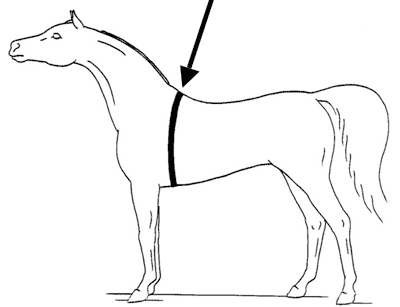Estimating A Horse’s Body Weight
Benefits of Knowing Your Horse’s Body Weight
Since both weight gain and weight loss can impact a horse’s health, it’s important to monitor your horse’s body weight. Knowing your horse’s weight is helpful for the following:
- Determining how much to feed them
- Determining the right dosage of medicine or dewormer
- Deciding what type of weight management program is best
How to Estimate a Horse’s Body Weight
Most horse owners estimate their horse’s body weight by the “eye method” which can produce errors up to 20 – 25%. A 20% error for a 1000-pound horse could mean an inaccurate body weight estimate as low as 800 pounds or as high as 1200 pounds. There are two simple (and more accurate!) methods available to horse owners for estimating the body weight of adult horses: the weight tape and the weight table.
Weight Tape
Properly calibrated “weight tapes” are available commercially and most appear to be reasonably accurate within 5-10%. Consistency in technique improves accuracy. Weight tapes are placed around the heart girth. A reference point for the heart girth is approximately 4 inches, or a little more than a “hands-width”, behind the point of elbow. The figure below illustrates the correct use of the weight tape. A frequent mistake is that horse owners will adjust the placement of the weight tape relative to the withers. Do not use the withers as a guide! The weight tape is properly placed if an imaginary line bisects the weight tape (top & bottom) so that the imaginary line is perpendicular to the ground.
Weight Table
Using a non-stretchable material, such as a nylon strap, measure the horse’s heart-girth (inches) and compare the measurement to body weights in the corresponding table. The figure below also illustrates the correct method in measuring heart girth circumference.

| Heart Girth (in.) | Total Weight (lbs.) |
|---|---|
| 30.0 | 100 |
| 40.0 | 200 |
| 45.7 | 300 |
| 50.5 | 400 |
| 55.4 | 500 |
| 59.0 | 600 |
| 62.4 | 700 |
| 65.4 | 800 |
| 68.4 | 900 |
| 70.4 | 1,000 |
| 72.5 | 1,100 |
| 75.0 | 1,200 |
| 77.4 | 1,300 |
| 78.6 | 1,350 |
| 79.9 | 1,400 |
Weighing your horse regularly with one of the above methods will help you monitor their weight. This information allows you to feed them properly, monitor their overall health, and prevent under- or overdosage when de-worming or giving certain medications.
